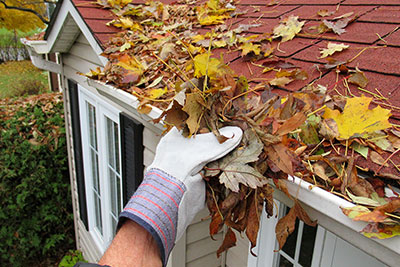 For those who live in snowy climates, winter is on the way. Take advantage of those sunny fall days to prepare your home and yard for frigid temperatures and icy conditions before the snow flies. Making sure your home is well-maintained inside and out will keep you safe and protected through the winter season. Here's how to get ready:
For those who live in snowy climates, winter is on the way. Take advantage of those sunny fall days to prepare your home and yard for frigid temperatures and icy conditions before the snow flies. Making sure your home is well-maintained inside and out will keep you safe and protected through the winter season. Here's how to get ready:
- Clear your gutters: After the foliage has fallen, find an afternoon to clear your gutters of leaves and other debris. This will keep water flowing freely and prevent damage caused by overloading.
- Repair walkways: If any walkways around your home are damaged or uneven, take the time to get them repaired before conditions become more treacherous.
- Gather supplies: Put away spring and summer equipment and move your shovels, snowblower and other snow removal gear to an easily accessible spot. Stock up on sand and salt to help clear icy walkways and make them safer to navigate.
- Secure windows: Remove air conditioners, clean windows and check for any cracks or broken seals. Install storm windows or insulate them with inexpensive plastic to increase your home's efficiency.
- Service your sprinklers: Whether you have your sprinkler system blown out by a professional or do it yourself, make sure to take care of it before the temperature drops too low.
- Take care of hoses and pipes: Clean and detach outdoor hoses and turn off the outdoor water supply when it's no longer needed. Insulate outside spigots to prevent pipes from freezing in extreme temperatures.
- Check the roof: Inspect your roof, checking for damage or leaks, and have any problems repaired.
- Store your barbecue: Clean your barbecue thoroughly before covering and storing for winter. Make sure to detach the propane tank and store outside, not in your home or garage.
- Maintain your trees: Storms can cause major injuries to large trees, which can in turn damage your home or worse, injure someone. Have your trees looked at by a professional so that any loose or unsturdy branches can be removed before they fall.
- Turn up the heat: Test out your heating system and make sure it's working properly before you really need it.
- Check your batteries: Replace the batteries in your fire and CO2 alarm, and make sure they are working correctly. Review the signs of CO2 poisoning so you can keep your family safe.
- Clean the fireplace: Make sure fireplaces, wood stoves and chimneys are cleaned and inspected before their first use.
- Build a safety kit: Collect supplies you can use in case of a power outage or severe storm, such as flashlights, batteries, fresh water, and non-perishable foods. Make sure you have access to important medications and basic medical supplies. And don't forget food and supplies for your pet.
For any home insurance questions, call or contact Litaker Insurance today.
